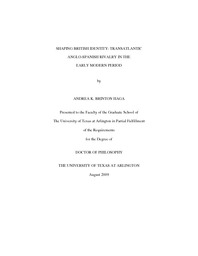
ATTENTION: The works hosted here are being migrated to a new repository that will consolidate resources, improve discoverability, and better show UTA's research impact on the global community. We will update authors as the migration progresses. Please see MavMatrix for more information.
Show simple item record
| dc.contributor.author | Haga, Andrea K. Brinton | en_US |
| dc.date.accessioned | 2009-09-16T18:19:41Z | |
| dc.date.available | 2009-09-16T18:19:41Z | |
| dc.date.issued | 2009-09-16T18:19:41Z | |
| dc.date.submitted | January 2009 | en_US |
| dc.identifier.other | DISS-10358 | en_US |
| dc.identifier.uri | http://hdl.handle.net/10106/1771 | |
| dc.description.abstract | Traditional nationalism studies focus primarily on nineteenth-century developments of state-formation and the imposition of nationalistic compulsions from the top down. This study challenges that theoretical framework by arguing that nationalism is evident in much earlier centuries, that nationalistic sentiment is expressed from the bottom up, and that the state is often compelled to assert itself against political rivals in response to the needs and desires of its citizenry. Nationalism is essentially mere rhetoric--the language of the state and its people--in order to encourage or compel compliance in response to the necessity of the state to achieve specific political goals. The examination of the British anti-Spanish rhetoric of the seventeenth and eighteenth centuries regarding colonial issues reveals the emergence of the British national identity. From this early modern British rhetoric is the revelation that nationalism is not necessarily a state-imposed mandate, rather nationalism emerges from the people and the state as a response to outside political, economic, and social threats. This study evaluates the language of the British people who were interested in transatlantic colonial activities, between the years 1606-1739 (the founding of Jamestown to the War of Jenkins' Ear/Anglo-Spanish War). British colonial and trading activities placed them within the territories that the Spanish claimed for themselves, resulting in an inevitable conflict between the two nations for nearly two centuries. Through the evaluation of cases of British ship seizures and the public discussion of those cases, the British reveal their assertion of national identity as a product of the nation's ability to "triumph" over the Spanish through successful negotiations for ship reparations as well as gain Spanish acknowledgements to British "rights" to their colonial territories. | en_US |
| dc.description.sponsorship | Reinhardt, Steven G. | en_US |
| dc.language.iso | EN | en_US |
| dc.publisher | History | en_US |
| dc.title | Shaping British Identity: Transatlantic Anglo-Spanish Rivalry In The Early Modern Period | en_US |
| dc.type | Ph.D. | en_US |
| dc.contributor.committeeChair | Reinhardt, Steven G. | en_US |
| dc.degree.department | History | en_US |
| dc.degree.discipline | History | en_US |
| dc.degree.grantor | University of Texas at Arlington | en_US |
| dc.degree.level | doctoral | en_US |
| dc.degree.name | Ph.D. | en_US |
| dc.identifier.externalLink | http://www.uta.edu/ra/real/editprofile.php?onlyview=1&pid=1542 | |
| dc.identifier.externalLinkDescription | Link to Research Profiles | |
Files in this item
- Name:
- Haga_uta_2502D_10358.pdf
- Size:
- 930.5Kb
- Format:
- PDF
This item appears in the following Collection(s)
Show simple item record


